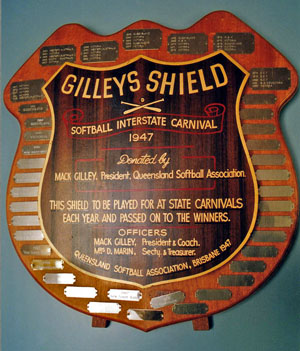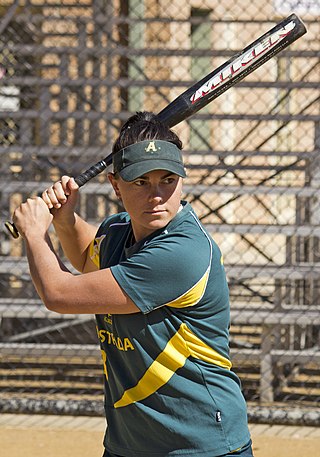Related Research Articles

Australia's softball history began in 1939 when Gordon Young, Director of Physical Education in NSW, began to promote the game in schools and colleges. In 1942, during World War II, US army sergeant William Duvernet organised softball as a recreation for US nurses stationed in Victoria. Another American, Mack Gilley, introduced the game to Queensland in 1946. Australia's first inter-state championship was played in Brisbane in 1947 and was won by Victoria. The second national championship was held in Melbourne two years later. It was at this championship that the Australian Softball Federation was formed with Queensland, Victoria, South Australia and New South Wales being the founding members. The other States of Australia have since joined. Eight Australian Championships are now conducted each year – Women's, Men's, Under 23 Women and Men, Under 19 Women and Men, and Under 16 Girls and Boys. Softball has been a major sport in the schools program for some time now and it is estimated that more than 250,000 children play the game each year.

The Gilleys Shield is a trophy symbolising the Open Women's Championship of the Softball Australia organisation. The competition's full name is the Mack Gilley Shield.

The Elinor McKenzie Shield is a trophy symbolizing the Under 18 Women's Championship of Softball Australia.

Softball was on the Olympic program from 1996 to 2008. It was introduced at the 1996 Atlanta Olympics and was removed from the program for 2012 and 2016, but was added for a one-off appearance, along with baseball, for the 2020 Summer Olympics.
The Queensland Softball Association, now known as Softball Queensland, organises and develops the sport of softball in Queensland, Australia. Founded in 1946 as a women's association, it runs an annual state championship and state league, and attends all ASF National Championships.
Softball in Australia is played in Australia.
The Australia women's national softball team, also known as the Aussie Spirit, is the national softball team of Australia. It is governed by Softball Australia and takes part in international softball competitions. They are one of Australia's most successful women's sporting teams on the world stage, and they have achieved outstanding results over the last 3 decades. Alongside the USA team, the Aussie Spirit are the only other team to medal at all 4 Olympics that softball was included as a sport in the Olympics program. At the inaugural Women's Softball World Championship held in Melbourne, 1965. Australia claimed the first ever title, winning Gold and stamped themselves as a pioneer in the sport.

Jodie Bowering is an Australian softball player. She is a physical education and health teacher who plays softball at the state, national and international level. In national competitions, she represents Queensland. As a member of Australia's 2008 team, she won a bronze medal in Beijing. She is a member of the 2012 national team and is attempting to secure a spot to compete at the 2012 ISF XIII Women's World Championships.

Jade Wall is an Australian softball player. Wall started playing softball as a nine-year-old. She had a softball scholarship with the Queensland Academy of Sport. She represents Queensland in state competitions and, at one point, was the youngest player on Queensland's open women's team. She has been a member of Australia women's national softball team on the junior and senior level. She is on the short list of players vying to compete at the 2012 ISF XIII Women's World Championships.
Softball is played in New South Wales, introduced to the state in 1939. By 1984, there were 1,356 registered teams in New South Wales. Players from Australia have been on the men's and women's national team, had AIS scholarships, played at universities in the United States, and professionally in the US, Japan and Europe.
Softball is played in the Australian state of Victoria.
Softball is played in Tasmania. The game was brought to the island during the late 1940s from Melbourne, Victoria. The sport would grow in popularity in Tasmania with 56 teams in 1976 to 216 in 1984. Men's softball is not popular in Tasmania. The first softball only facility was built in Tasmania in 1984.
Softball is played in South Australia.
Softball is played in Western Australia.
Softball is played in the Australian Capital Territory. The game was influenced early in its history in the territory by Queanbeyan. There are efforts to increase participation in the sport in the ACT. The territory has won the Gilleys Shield three times in a row. Players from Canberra have been on the national team, held Australian Institute of Sport scholarships and played for American universities.
Softball is played in the Northern Territory, Australia.

The Australian Men's Softball Team is the national softball team of Australia. They are nicknamed the Aussie Steelers. The team is governed by Softball Australia and takes part in international softball competitions.
Zimbabwe men's national softball team is the national softball team for Zimbabwe. The 1988 World Championships were held in Saskatoon, Canada. The team played 13 games in the round robin round. Australia beat Zimbabwe 2–0 in one game in this round.
Cuba men's national softball team represents Cuba in international softball competitions. The team played at the 1988 World Championships were held in Saskatoon, Canada. They played 13 games in a round robin tournament, and beat Australia 7–4 in one game.
The Czechoslovakia men's national softball team made only one international appearance, in the 1992 World Championships in Manila. It had a record of 1-7 in the preliminary round-robin round and did not advance.
References
- ↑ Embrey, Lynn; Australian Softball Federation (1995). "Hits and Bunts". Batter up! : the history of softball in Australia. Bayswater, Vic.: Australian Softball Federation. pp. 69–127.
- ↑ Cashman, Richard (2001). Australian sport through time. Milsons Point, N.S.W.: Random House Australia. p. 259. ISBN 1740514459. OCLC 223005022.
- 1 2 3 4 5 Pollard, Jack (1968). AMPOL book of Australian Sporting Records. Sydney: The Pollard Publishing Co. pp. 273–274. OCLC 71140.
- ↑ Vamplew, Wray; Australian Society for Sports History; Australian Sports Commission (1994). The Oxford companion to Australian sport (2 ed.). Melbourne: Oxford University Press. pp. 388–389. ISBN 0195532872. OCLC 27509815.
- ↑ Embrey, Lynn; Australian Softball Federation (1995). "Appendix H". Batter up! : the history of softball in Australia. Bayswater, Vic.: Australian Softball Federation. p. 170.
- ↑ "Softball: Softball Australia". A survey of cultural diversity and racism in Australian sport (PDF). Australia: Australian Human Rights Commission. p. 10. Retrieved 18 March 2012.
- 1 2 Vamplew, Wray; Australian Society for Sports History; Australian Sports Commission (1994). The Oxford companion to Australian sport (2 ed.). Melbourne: Oxford University Press. p. 521. ISBN 0195532872. OCLC 27509815.
- 1 2 Grams, Jacob (29 February 2012). "Sports extra with Jacob Grams". Northside Chronicle. Brisbane. p. 55. NSC_T-20120229-1-055-480689. Retrieved 7 March 2012.
- ↑ "Locals keep state on ball softball". Redcliffe Bayside Herald. Brisbane, Australia. 10 January 2007. p. 102. Retrieved 13 March 2012.
- ↑ "Olympics heartache fightback". The Northern Times. Brisbane, Australia. 19 September 2008. p. 49. TNT_T-20080919-1-049-096911. Retrieved 9 March 2012.
- ↑ "Bailey selected to join Steelers". Ipswich News. Australia. 29 February 2012. p. 34. Retrieved 18 March 2012.
- ↑ Cashman, Richard (2001). Australian sport through time. Milsons Point, N.S.W.: Random House Australia. p. 334. ISBN 1740514459. OCLC 223005022.
- ↑ "Softball — Jodie Bowering". Bruce, Australian Capital Territory: Australian Institute of Sport. Archived from the original on 25 March 2012. Retrieved 8 March 2012.
- 1 2 "Australian Open Women's Squad 2012". Australia: Softball Australia. 24 February 2012. Archived from the original on 19 March 2012. Retrieved 6 March 2012.
- ↑ Embrey, Lynn; Australian Softball Federation (1995). "The Olympics". Batter up! : the history of softball in Australia. Bayswater, Vic.: Australian Softball Federation. pp. 152–156.
- ↑ Embrey, Lynn; Australian Softball Federation (1995). "Scholarships: Softball's "Brain Drain"". Batter up! : the history of softball in Australia. Bayswater, Vic.: Australian Softball Federation. p. 136.
- ↑ Department of Sport, Recreation and Tourism; Australian Sport Commission (1985). Australian Sport, a profile . Canberra, Australia: Australian Government Publish Service. p. 186. ISBN 0644036672.